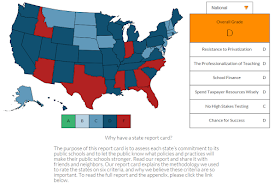Network for Public Education Rates States’ Support for Public Education

On Tuesday afternoon, the Network for Public Education (NPE) released a report that evaluates the states by what is today an unconventional set of standards. States earn points if they have valued school teachers and supported the professionalization of teaching. States earn points for having invested in adequate school funding equitably distributed and for investing in research-proven programs. And they gain points for reducing poverty and integrating schools racially and economically. The report takes away points from states that have attached high stakes to the federally mandated standardized tests. NPE removes points from states that have privatized schools.
Here is NPE’s description of the principles affirmed in the new report: “NPE values specific policies that will make our public schools vibrant and strong—a well-trained, professional teaching force, adequate and equitable funding wisely spent, and policies that give all students a better opportunity for success, such as integrated schools and low stakes attached to any standardized tests they take. We applaud those states that have resisted the forces of privatization and profiteering that in recent years have been called ‘reforms.'”
Since the passage of the No Child Left Behind Act in 2002, our society has increasingly evaluated schools by the test score outcomes they are said to “produce” with lessening attention to measures of opportunity—the resource inputs necessary for ensuring that children have well-prepared teachers, small enough classes for children to be known and supported by an adult, enough funding for competitive salaries, and a rich curriculum including the arts. The report ranks the states by their policies that guarantee the provision of such resource opportunities.
In the section on “professionalization of teaching,” the report confronts policies in some states that view teachers “as interchangeable—experience is discounted, even viewed as a flaw.” Instead, “Teaching should be a long-term career commitment. Research shows that experience matters and leads to better student outcomes, including increased learning, better attendance and fewer disciplinary referrals. Advanced content degrees, especially in mathematics and science, have a positive effect on student learning and good pre-service field experience builds teacher effectiveness, confidence and job satisfaction.”
Money matters, and provides smaller classes and more support staff. “More spending is Network for Public Education Rates States’ Support for Public Education | janresseger:
